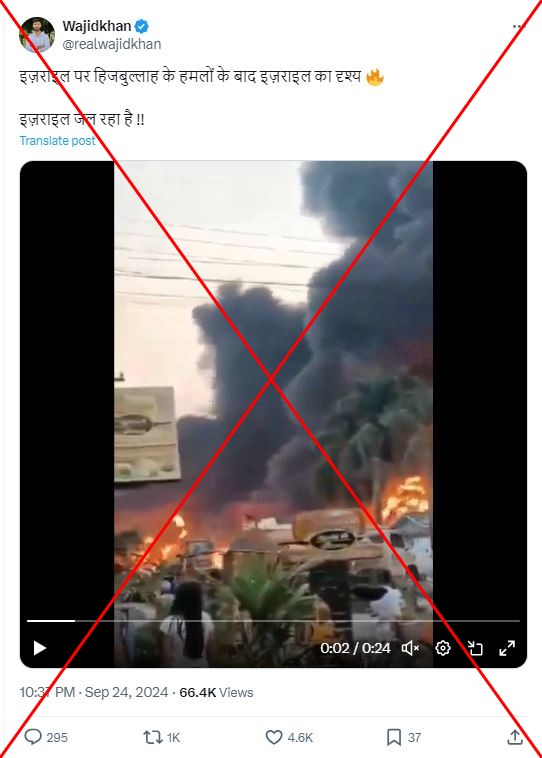As the situation intensified between Israel and Hezbollah in late September 2024, misinformation surged on social media, with a video of a fire in Brazil being erroneously linked to the ongoing conflict. This clip, which first gained attention during news reports in August 2024, depicted a significant blaze that impacted a warehouse in Novo Progresso, a town in Brazil’s Para state. Despite the video’s true origins, it was widely disseminated with misleading claims, such as a Hindi-language post on X (formerly Twitter) that stated, “Israel after Hezbollah’s attacks, Israel is burning.” The context of these false claims came amid escalating hostilities between Israel and Hezbollah, which had heightened following a series of exchanges that resulted in substantial casualties and displacement.
Hezbollah’s military response, characterized by targeting Israeli bases, escalated the already tense situation, sparking fears of an all-out war. The latest wave of conflict unfolded against the backdrop of sustained skirmishes since the Hamas assault on southern Israel on October 7, 2023, which had devastating effects, claiming over 1,200 lives, mostly civilians. These striking numbers included lives lost during attacks and as a result of ongoing combat operations, raising alarms regarding the potential for an expanded regional confrontation. Meanwhile, Israel’s retaliatory airstrikes and military offensives in Gaza led to catastrophic consequences, resulting in the deaths of over 42,000 people, highlighting the grim nature of the conflict.
Amidst this turmoil, the flood of misinformation, including the viral fire footage, showcased a critical aspect of modern conflict—disinformation campaigns that capitalize on real-time events. The fire video circulated on platforms such as X and Facebook with various misleading narratives, reinforcing the idea that information can easily be manipulated in crises. The unprecedented nature of these claims and their rapid dissemination pointed to the need for accurate reporting and fact-checking, particularly in times of heightened military tensions.
A closer examination of the viral clip revealed its true context: the fire actually occurred in a Brazilian warehouse and was unrelated to any events occurring in the Middle East. A reverse image search traced the footage back to August 11, 2024, when a Brazilian news outlet, Portal Roma News, reported on the massive fire affecting a warehouse on Dr. Isaias Antunes Avenue in Novo Progresso. The localized nature of the incident was further corroborated by images from the site, including a sign from a nearby restaurant, Churrascaria e Restaurante Polentao, which was visible in the video. This highlighted a fundamental issue concerning the misinterpretation and misinformation spreading rapidly on social media platforms, often leading to significant misunderstandings about ongoing global events.
The case of the Brazilian fire underscores the broader challenges faced by social media users and journalists alike in discerning fact from fiction, particularly in relation to international conflicts. The juxtaposition of images from the Brazilian incident with claims of Israeli destruction exemplified how visuals could be divorced from their original context to serve narratives that may not reflect reality. Local outlets confirming the details of the fire further dispelled the unfounded rumors circulating on social media.
As misinformation continues to thrive alongside geopolitical tensions, the escalation of the conflict between Israel and Hezbollah demonstrates the urgent need for rigorous fact-checking and responsible sharing of information online. The amplification of misleading content complicates public discourse, potentially fueling misunderstandings and exacerbating existing tensions. Confirming facts before sharing is essential to ensure that the dangerous cycle of misinformation does not further complicate an already volatile situation. Efforts by reputable media to provide clear and accurate accounts of events are vital in combating the spread of disinformation and fostering a more informed public amidst the uncertainty of conflict.

